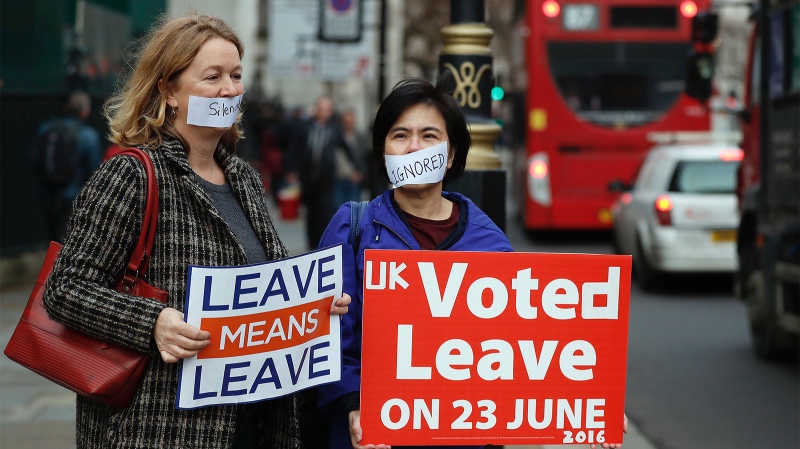London
RNS
It’s a sign of how alone British Prime Minister Theresa May is on her Brexit deal that the one friend of her policy to be found was one Lynn Hayter, a “born and bred” Conservative Leave-voter who opposes freedom of movement for European Union citizens, who took part in a panel discussion on BBC’s Newsnight.
Wearing a clerical collar, Hayter urged viewers to “sit it out and put faith in the government that we have elected and put faith in the [Brexit] vote that we voted for.”

Demonstrators rally in favor of Brexit outside the Houses of Parliament in London on 6th December. PICTURE: Frank Augstein/AP Photo.
It turns out that Hayter is an actor whose work includes roles as an extra on BBC dramas. Her clerical collar signified her membership not in the Church of England or any other mainstream denomination but in the rather dubious Seeds for Wealth ministry she founded herself and launched on YouTube two years ago.
Conspiracy theorists claimed that the BBC had recruited the actor for the show, and her collar was meant to lend her an air of establishment respectability. The BBC denied the claims.
Wherever the truth lies, Hayter appeared to be one of the few people in a clerical line to take a firm stand on Brexit.
The church did not take an official position during the 2016 referendum campaign. While the Archbishop of Canterbury, the leader of Anglicanism in the UK and abroad, and the Archbishop of York, his traditional second, both let it be known that they wished Britain to remain within the EU, neither has come out in favor of a second referendum, the last hope for those who wish to stay part of the European Union.
The one bishop who declared himself a Leaver, the former Bishop of Shrewsbury Mark Rylands, said his colleagues were incredulous when he told them of his voting intentions, subjecting him to “gentle mockery“.
The difficulty is that most rank-and-file Anglicans hold views on Brexit closer to Hayter’s.
Research by Professor Linda Woodhead from Lancaster University and Greg Smith from the William Temple Foundation showed that 66 per cent of voters in England who identified as Anglican voted to leave the EU compared with 55 per cent of people belonging to other Christian denominations, 49 per cent of those from other faiths and 47 per cent of those who said they had no religion.
In a resource on managing the spiritual aspects of Brexit published by the Church of England and the ecumenical “Churches Together in England and Ireland” after the referendum passed in 2016, the authors expressed surprise that “a number of faithful Christians, active members of their local churches, were among the most anti-migrant voices.” (The free flow of migrants within EU borders has been one of the drivers of Leave sentiment.)
These respondents said they felt unable to freely express their opinions about the impact migration was having on housing and jobs in their communities because those opinions didn’t chime with the Christian message of tolerance and “niceness.”
The report concluded that perhaps the churches had “been putting pressure on people to be more Christlike than they can handle.”
Meanwhile, calls are growing for the established church, which is expected to respond to momentous events in the life of the nation, to somehow mark Britain’s departure from the EU.
In the past, it has gotten the tone just right. The memorial service for victims of the Grenfell Tower fire, held at St Paul’s Cathedral in London a year ago, was a Christian service during which, in recognition of the faith of many of those who died, Muslim schoolgirls sang of the help they receive from Allah. The sermon, from the Bishop of Kensington, didn’t shy away from questions about structural injustice and the social divisions highlighted by the tragedy.
The dilemma about how to respond becomes more acute, however, when those divisions are tearing at the church itself. Some Christians will want to celebrate Britain’s departure from the EU; others see it as a cause for lament.
That doesn’t mean bishops can file the question under “too difficult,” warned the former dean of Durham Michael Sadgrove in a letter to the Church Times. Frustrated insiders at church headquarters say many of them have been doing just that. The issue is certain to be at the top of the agenda for the bishops when they meet in conference next week.
“I’m sure churches locally will be open for prayer on Brexit Day [still 29th March, 2019, as of this writing], but the national church can’t hold back from holding some kind of public event as we leave the European Union,” said Sadgrove. “It’s unthinkable that it should do so. Liturgy is one of the ways we gather up and ritualise the events that shape our life as a nation. If ever there was a time we needed to do this, it’s now.”
Parliament votes on Theresa May’s Brexit deal on Tuesday (11th December). Few pundits expect it to be approved. It’s still possible that by the time the House of Bishops finishes meeting the following day, they’ll be clearer about exactly what they are being called to respond to. But no one should count on that.






